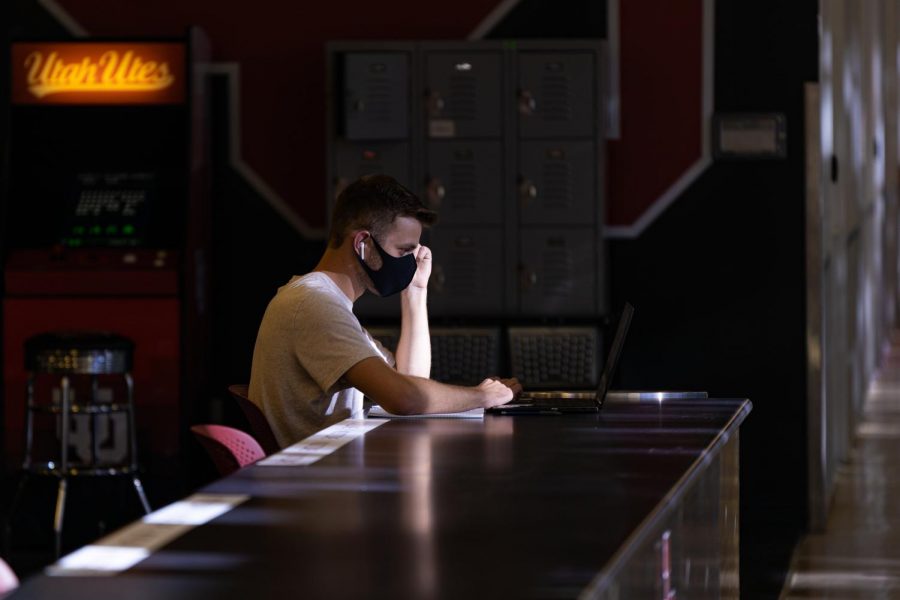Kincart: Support Students During the Pandemic
(Photo by Abu Asib | The Daily Utah Chronicle)
January 28, 2021
Last semester brought many difficulties because of the ongoing COVID-19 pandemic. As we head into the spring semester, every one of us is hoping for a better learning experience. The ASUU Senate passed A Resolution in Support of Student Wellbeing in COVID-19 on Nov. 30. The hope with this resolution is that faculty adapts their courses to address the needs of students during the pandemic.
This includes verbally discussing accommodations on work, mental health days as excused absences, and a weeklong break from assignments to make up for the lack of spring break. We collectively struggled last semester and the ASUU Senate acted. These suggestions will make for a more manageable semester during the pandemic. As we commence the spring semester, instructors should take the suggestions of the resolution not only for their benefit but for their students as well.
We experienced the shortcomings of virtual education last semester and it’s time we see change. Nationwide, 56 percent of college students said they were “moderately,” “very,” or “extremely” worried about their mental health during the pandemic. Thus, we need to see improvements in the delivery of remote learning. The American Council on Education recommended consistent caring and clear communication with students. Having clear recording policies would have eased our worries about missing material when we inevitably zone out after staring at a computer screen for hours.
This worry is also taken into account by the 5- minute “biology break” proposed in the resolution. I’m sure I’m not alone in the struggle of wondering whether I was called on while I quickly turned off my camera and ran to the bathroom during class. There were times when we could’ve benefited from an extension. A verbal discussion of extension policy helps us remember that sometimes we need to prioritize our wellbeing over schoolwork. We grew tired in the middle of the semester and never got our much-needed break. I had professors comment on declining performance in the class. All of these hardships have a chance to be mitigated if the faculty takes the actions suggested by the resolution.
Although this resolution is rightfully framed around helping students, it’ll also help faculty. When remote learning began, educators were asked to make sense of fuzzy guidelines from administration and abandon their typical means of teaching. They needed to figure out how to build relationships and meet students’ needs through a screen. We are all familiar with burnout, and so are our professors. Not only is the fatigue affecting experiences in the classroom, but research output is also suffering. Particularly, research submission data points to a decline in female submissions. This is most likely due to balancing the expectations of motherhood, homeschooling, and work from home.
The proposed mid-semester break from assigned work allows for professors to catch up on grading and take a break. Engagement through discussion boards, polling, and whiteboard features on Zoom can facilitate fulfilling teacher-student relationships. Faculty and students alike benefit from the engagement methods suggested in the resolution. After all, relationships are a two-way street, and we all felt the shortcomings of this support last semester. The resolution also calls for faculty to prioritize their mental health by taking sick days. As students, we should give faculty the same understanding and empathy that we desire when prioritizing mental health.
If we don’t prioritize the well-being of students and faculty this semester, there will be consequences in the short term and long term. As we experienced in the past few semesters, academic performance will suffer and college enrollment will decline. I was a high school senior when COVID-19 started. I paid particular attention to the ways in which the universities I was considering handled the pandemic. I’d expect the same from prospective students going into future semesters.
In the long term, academic performance will affect graduation rates, scholarship eligibility, admission to further education, and even inequality. The struggle against inequality and the current financial crisis exacerbates the psychological stress placed on students of color. Thus, inequality increases as we ignore the phycological challenges of COVID-19. This resolution plays an important role in reversing the stigma associated with mental health as it advocates for three “mental health days.” These absences are like excused absences but require no medical documentation—recognizing that we all struggle with our mental health.
In the fall, students and faculty endured one of the most challenging semesters to date. Let’s not go through it again. Everyone benefits from A Resolution in Support of Student Wellbeing in COVID-19, so let’s put it into action during the spring 2021 semester.








